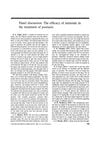 December 2022 in “International Research Journal Of Modernization In Engineering Technology And Science”
December 2022 in “International Research Journal Of Modernization In Engineering Technology And Science” Cosmeceuticals are special products that improve skin and hair health and have benefits like treating acne and wrinkles, protecting from the sun, and helping with dandruff and hair growth.
 December 2015 in “JAMA Dermatology”
December 2015 in “JAMA Dermatology” Dermatologists can help diagnose endocrine disorders like PCOS and metabolic syndrome by looking at skin symptoms.
 17 citations,
September 2017 in “Journal of Cosmetic Dermatology”
17 citations,
September 2017 in “Journal of Cosmetic Dermatology” Women with PCOS in North China often have hirsutism and acne, with hirsutism linked to metabolic issues.
 April 2024 in “Frontiers in cellular and infection microbiology”
April 2024 in “Frontiers in cellular and infection microbiology” Blue light might help treat skin conditions by affecting the skin's bacteria.
 September 2023 in “International Journal For Multidisciplinary Research”
September 2023 in “International Journal For Multidisciplinary Research” Ayurvedic treatments can help manage PCOS symptoms.
 December 2022 in “Medical lasers”
December 2022 in “Medical lasers” Low-level laser therapy may help with hair regrowth in alopecia areata but its effectiveness for psoriasis and atopic dermatitis needs more research.
 January 2016 in “Springer eBooks”
January 2016 in “Springer eBooks” A 19-year-old male with delayed puberty was successfully treated for a condition that prevents normal hormone production.
 April 1982 in “Journal of The American Academy of Dermatology”
April 1982 in “Journal of The American Academy of Dermatology” Retinoids help treat psoriasis effectively, but they can cause side effects and need more research on safe use with other treatments.
 56 citations,
August 1981 in “Journal of The American Academy of Dermatology”
56 citations,
August 1981 in “Journal of The American Academy of Dermatology” Minoxidil helps hair regrowth in alopecia areata safely.
 January 2021 in “Scholars journal of medical case reports”
January 2021 in “Scholars journal of medical case reports” A woman with PCOS successfully overcame secondary infertility and became pregnant with triplets after treatment.
 100 citations,
September 2017 in “Molecular and Cellular Endocrinology”
100 citations,
September 2017 in “Molecular and Cellular Endocrinology” Male hormones and their receptors play a key role in hair loss and skin health, with potential new treatments being explored.
 4 citations,
June 2022 in “Clinical, cosmetic and investigational dermatology”
4 citations,
June 2022 in “Clinical, cosmetic and investigational dermatology” The new SFS Scale predicts hair transplant difficulty using hair and skin types, with thick skin and coily hair being hardest to work with.
January 2023 in “Indian Dermatology Online Journal” Female pattern hair loss in Western India is common and often linked to metabolic syndrome.
200 citations,
August 2009 in “Experimental dermatology” Eating high-glycemic foods and drinking milk may worsen acne by increasing insulin and IGF-1 levels.
 93 citations,
January 2016 in “British Journal of Dermatology”
93 citations,
January 2016 in “British Journal of Dermatology” Eating a high-glycemic diet may worsen acne by increasing certain protein levels and expressions in the skin.
29 citations,
January 2016 in “Disease Markers” Survivin and IGF-I may play a role in acne and scarring.
 75 citations,
May 1986 in “Clinics in endocrinology and metabolism”
75 citations,
May 1986 in “Clinics in endocrinology and metabolism” Male hormones are important for hair and oil gland development and can cause conditions like excessive hair growth and acne.
 September 2021 in “CRC Press eBooks”
September 2021 in “CRC Press eBooks” Acne keloidalis nuchae is a hair loss condition affecting men of African descent, causing scar-like bumps on the scalp and neck.
 29 citations,
March 2017 in “International Journal of Women's Dermatology”
29 citations,
March 2017 in “International Journal of Women's Dermatology” Hormone therapies like birth control pills and spironolactone are safe and effective for treating women's adult acne.
 1 citations,
April 2021 in “International Journal of Dermatology”
1 citations,
April 2021 in “International Journal of Dermatology” Women with conditions like PCOS may have a higher risk of COVID-19, but treatments like isotretinoin could help those with acne.
 January 2019 in “Obstetrics & Gynecology International Journal”
January 2019 in “Obstetrics & Gynecology International Journal” Hormonal changes and conditions like polycystic ovarian syndrome are major causes of adult acne in women, with varying prevalence among different ethnicities.
 27 citations,
June 2017 in “International Journal of Dermatology”
27 citations,
June 2017 in “International Journal of Dermatology” The study suggests that acne keloidalis nuchae is linked to conditions like pseudofolliculitis barbae, scalp infections, metabolic syndrome, and is more common in males with an average onset age of 25.4 years.
 14 citations,
January 2020 in “Dermatology Online Journal”
14 citations,
January 2020 in “Dermatology Online Journal” Some dietary supplements, like vitamins B6/B12, iodine, whey protein, and muscle-building products, can cause or worsen acne.
 9 citations,
April 2015 in “Dermatologic Therapy”
9 citations,
April 2015 in “Dermatologic Therapy” Hormonal therapies, like flutamide and cyproterone acetate, are safe and effective for treating adult women's acne, especially those with hormone imbalance or resistant acne.
 6 citations,
May 2015 in “Clinics in Dermatology”
6 citations,
May 2015 in “Clinics in Dermatology” Acne and other skin conditions can indicate internal diseases like Polycystic Ovary Syndrome (PCOS), and early treatment can prevent long-term issues.
 5 citations,
February 2019 in “BioMed Research International”
5 citations,
February 2019 in “BioMed Research International” Acne in reproductive-age women may be linked to conditions like PCOS and lifestyle factors, so doctors should check for these when treating acne.
 24 citations,
December 1988 in “British Journal of Dermatology”
24 citations,
December 1988 in “British Journal of Dermatology” Acne severity in women may not be linked to increased male hormone indicators like excess body hair, menstrual irregularities, or hair loss.
9 citations,
January 2013 in “BioMed research international” The conclusion suggests a new acne treatment that controls bacteria by reducing water in the skin's pores using sugar-like substances.
 January 2016 in “Springer eBooks”
January 2016 in “Springer eBooks” Hyperandrogenism, often causing excessive hair growth and acne, can be treated with methods like weight reduction, hair removal, various medications, and in the case of acne, topical treatments.
 24 citations,
November 2016 in “Molecular Medicine Reports”
24 citations,
November 2016 in “Molecular Medicine Reports” Hormonal imbalances, often indicating conditions like PCOS, are common in women with hard-to-treat acne, and a treatment approach addressing these imbalances may be needed.


























